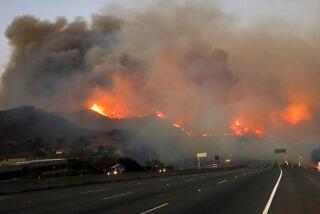L.A. Council Gets Tough on Emergency Medical Bills
Continuing its search for new revenue, the Los Angeles City Council voted Friday to aggressively pursue unpaid bills for ambulance and emergency medical services--an effort that could raise up to $1.5 million annually.
The plan, proposed by San Fernando Valley Councilwoman Laura Chick, calls on the city to spend about $538,000 to hire a team of nine clerks and bill collectors to crack down on delinquent bills for an 18-month trial period.
“I get very excited about saving money and that is what this is going to do,” Chick said after the council voted unanimously for the plan.
Fire officials have said more staff members are needed because the Los Angeles Fire Department’s collection rate is about 50%, primarily due to an increasing workload and an overworked staff that doesn’t have time to follow up on each unpaid bill.
Over the past decade, the number of medical emergencies that the Fire Department has attended increased by about 50%, from 151,519 in fiscal year 1981-82 to 223,205 in fiscal 1992-93.
In 1992, the Fire Department collected more than $12 million in fees, about 5% of the department’s $230-million budget for that year.
To collect fees, the department sends a bill, then three follow-up notifications, fire officials said. But if the bills are ignored, the city’s collection efforts end.
Eric Rose, a Chick aide, blamed most of the lost revenues on bills sent to the wrong address or unpaid because of incorrect insurance information.
“We are not going after people who can’t pay,” Rose said. “We are losing millions of dollars a year because we are unable to go after people who can afford to pay the fees.”
One way the proposed collection unit can increase revenues is to track down people who have changed addresses and to correct erroneous insurance information that keeps the city from collecting the fees, he said. The program is aimed at generating an additional $1.5 million annually, Rose said.
More to Read
Sign up for Essential California
The most important California stories and recommendations in your inbox every morning.
You may occasionally receive promotional content from the Los Angeles Times.











